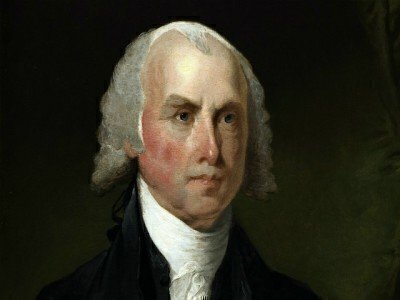On the occasion of James Madison's birthday, it's time to look at some of his most famous quotes about politics, equal rights, religion and the danger of tyranny.
 Madison wrote a lot during his lifetime as a public servant and in retirement. The Madison Papers archive has more than 72,000 pages, including some writings by his father and many of Madison’s personal notes and letters.
Madison wrote a lot during his lifetime as a public servant and in retirement. The Madison Papers archive has more than 72,000 pages, including some writings by his father and many of Madison’s personal notes and letters.
It was Madison whose notes at the Constitutional Convention give us insight into the debates at Philadelphia, and his contributions to the Federalist Papers and the Virginia Resolutions are other windows into the logic behind the Constitution.
Here are 10 famous quotes from Madison that seem to crop up in modern times, when people are still debating constitutional issues that were current in his lifetime.
Federalist 10, 1787
Liberty is to faction what air is to fire, an aliment without which it instantly expires. But it could not be less folly to abolish liberty, which is essential to political life, because it nourishes faction, than it would be to wish the annihilation of air, which is essential to animal life, because it imparts to fire its destructive agency.
Federalist 47, 1788
The accumulation of all powers, Legislative, Executive, and Judiciary, in the same hands, whether of one, a few, or many, and whether hereditary, self-appointed, or elective, may justly be pronounced the very definition of tyranny.
Federalist 49, 1788
The people are the only legitimate fountain of power, and it is from them that the constitutional charter, under which the several branches of government hold their power, is derived.
Federalist 51, 1788
If men were angels, no government would be necessary. If angels were to govern men, neither external nor internal controls on government would be necessary. In framing a government which is to be administered by men over men, the great difficulty lies in this: you must first enable the government to control the governed; and in the next place oblige it to control itself.
Statement at the Federal Convention in Philadelphia, 1787
The man who is possessed of wealth, who lolls on his sofa or rolls in his carriage, cannot judge the wants or feelings of the day-laborer. The government we mean to erect is intended to last for ages.
Another Statement at the Federal Convention in Philadelphia, 1787
A standing military force, with an overgrown Executive will not long be safe companions to liberty. The means of defence against foreign danger have been always the instruments of tyranny at home.
Letter To Thomas Jefferson, 1788
Wherever the real power in a Government lies, there is the danger of oppression. In our Governments, the real power lies in the majority of the Community, and the invasion of private rights is chiefly to be apprehended, not from the acts of Government contrary to the sense of its constituents, but from acts in which the Government is the mere instrument of the major number of the constituents.
In the Virginia Resolutions, 1798 (on the need for a free press)
[It is] a power, which more than any other, ought to produce universal alarm, because it is levelled against that right of freely examining public characters and measures, and of free communication among the people thereon, which has ever been justly deemed, the only effectual guardian of every other right.
In a letter to WT Barry, 1822
A popular Government, without popular information, or the means of acquiring it, is but a Prologue to a Farce or a Tragedy; or, perhaps both. Knowledge will forever govern ignorance: And a people who mean to be their own Governors, must arm themselves with the power which knowledge gives.
Letter To Jacob De La Motta, 1820
Equal laws protecting equal rights, are found as they ought to be presumed, the best guarantee of loyalty, and love of country; as well as best calculated to cherish that mutual respect and good will among citizens of every religious denomination which are necessary to social harmony and most favorable to the advancement of truth.







